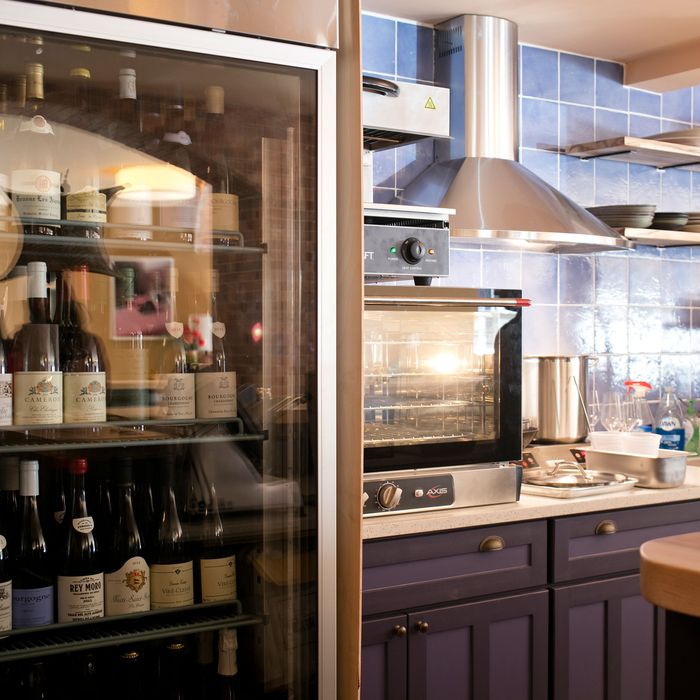
Brian Keyser, who owns Casellula Cheese & Wine Café in Hell’s Kitchen, now takes an electronic thermometer to work. Members of his staff will have to take their temperatures before they start their shifts. “It’s probably an overkill,” says Keyser, “but better safe than sorry.” If anyone has a fever or is experiencing worrisome symptoms, he will send them home.
With two confirmed cases of coronavirus in New York, the threat of a COVID-19 pandemic feels closer and more certain every minute. And in New York City — where proximity to strangers is a way of life — tens of thousands of restaurants are on the front lines of confronting the imminent virus.
Ariel Arce, owner of Tokyo Record Bar, Niche Niche, Air’s Champagne Parlor, and Special Club, is “making sure we follow the appropriate sanitary protocol that all restaurants are held to — hand-washing, sanitary wipes for tables, gloves for chefs, and drinking from our own glasses.” Plenty of hand sanitizer is showing up in restaurant bathrooms, too. In fact, thanks to the city’s strict food-safety and sanitary guidelines, it’s business as usual.
But the coronavirus threat looms large. “None of our clients want to exploit their workers or poison their customers,” says Lee Jacobs, a partner at Helbraun Levey, a New York law firm that specializes in the hospitality industry, and works with restaurateurs. “Nobody wants to be restaurant zero.”
Like all small business owners, Keyser is “worried that if it gets really bad, we’re not in a good position to absorb whatever the pressure of the crisis will bring.” As a tiny restaurant, Casellula doesn’t have enough workers to cover in an emergency. “We only have one cook, so if we send the cook home, there’s nobody left to make the food.”
For Barbara Sibley, of La Palapa Cocina Mexicana and Holiday Cocktail Lounge, her 150 employees are the priority. Sibley tries to keep them informed — facts help, panic does not — and does everything she can to support her staff in taking care of themselves and their health, which includes their emotional and mental well-being. “It’s about listening. If someone is super anxious, maybe they shouldn’t work that day, and that’s okay.” She adds that, in her 20 years in the business, she “went through 9/11, Hurricane Sandy, two blackouts, the recession in 2008 … and just like for this, my strategy is community care. New Yorkers are resilient.”
It helps that many restaurant workers are relatively young and healthy, which may make the virus less dangerous, but there are other concerns. “The vast majority of hourly employees in the hospitality business don’t have health insurance, so it’s not a good practice to require a doctor’s note,” Jacobs points out. Instead, they’re dependent on (hopefully) responsible business owners to make smart decisions, and although there are fair labor standards and minimum wage rules, employees who choose to stay home may risk forgoing pay, especially when they make most of their money in tips.
Restaurants also depend on the vibrant economic life of the city to survive. If office workers are told to stay home, if Broadway shows, concerts, and conferences are canceled, restaurants will quickly feel the effects. “Restaurants are the center of the commodities market,” Sibley says. “We’re like the canary in the coal mine.”
As Keyser says, the fraught financial reality of running an independent restaurant in New York means any economic slowdown could pose an existential threat. “Our business can’t afford to be closed for a month,” he says. “We can’t afford to pay our staff if we’re not bringing in revenue.”
Instead, many of the city’s restaurants are gearing up for big increases in delivery business, a strong possibility if people are staying home by choice or necessity. At Holiday, Sibley is even considering creating DIY cocktail kits for people stuck at home. “If people are in isolation,” she says, “and we can offer food and comfort — we will.”
Meanwhile, some neighborhood-restaurant owners are also thinking that those who avoid subways may still want to go out to eat near their apartments. And, of course, a whole lot remains unknown, and the best thing restaurateurs can do is be prepared.
“My first goal is to instill a sense of calm for my employees,” says Garima Kothari, the chef who owns Nukkad, an Indian restaurant in Jersey City. She’s also stocked up on tea and spices, ingredients she gets directly from India, in case it becomes difficult to import them in the coming weeks.
“People will need places to gather, even if they are small gatherings,” Sibley believes. And when this is all over, “People will need to pick up the pieces and reconnect.” When that happens, New York’s restaurants will be there.
This post has been edited to reflect the fact that Barbara Sibley is not the owner of Holiday Cocktail Lounge.




